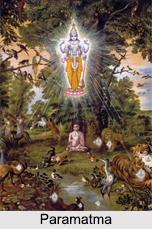 Paramatma or Paramatman is the Supreme Soul or Spirit. Paramatma is one of the aspects of Brahman or Bhagavan. This is the divine self or the one object and is located in the heart of every individual or jiva in the macrocosm in Hindu Puranas. Paramatma is beyond knowledge and ignorance, devoid of all material attributes.
Paramatma or Paramatman is the Supreme Soul or Spirit. Paramatma is one of the aspects of Brahman or Bhagavan. This is the divine self or the one object and is located in the heart of every individual or jiva in the macrocosm in Hindu Puranas. Paramatma is beyond knowledge and ignorance, devoid of all material attributes.
Etymology of Paramatma
The word Paramatma is formed from two words, "param", meaning `supreme` and "atman" meaning individual spirit or soul or self. Paramatma word also conveys endless existence, infinite realization, never-ending essence in endless Space, means the Atman of all the atmans or the Supreme Self or the Universal Self.
Representation of Paramatma
In the Hindu Puranas, Paramatma or Paramatman is the Supreme Soul or Spirit. This is the divine self or the one object and is located in the heart of every individual or jiva in the macrocosm. In Rigveda and Upanishads, Atman and Paramatma are compared to two birds sitting like friends on a tree. Atman eats its fruits, that is "karma" and Paramatma only observes his friend as a witness that is "sakshi" of his actions. In Vaishnava texts for instance, in Bhagavata Gita, Paramatma is described as four-armed Lord Vishnu dwelling in the hearts of all beings and in every atom of matter. He is the administrator and the controller of their actions. Paramatma is different from five elements or "panchabhutas", "senses", "mind", "pradhana" and "jiva".
In the modern times, Paramatma is universally used to refer to the Almighty, the God, interchangeably with Iswara or the Supreme Lord and Bhagavan. The word `Paramatma` perpetually summons the concept of the infinite, non-corporeal God in a monotheistic sense to today`s Hindus, even though Bhagavan etc. may be applied as epithets to many Devas or the demi-Gods of Hinduism. Some, like the sect of Brahma Kumaris, like to visualize Paramatma as a point of light.
In Advaita philosophy, there is a different concept of Paramatma. Here individual souls are called "Jivatman", and the Highest Brahman is called Paramatma. The Jivatman and the Paramatma become one and the same when the Jivatman achieves the true knowledge of the Brahman.
Paramatm in Jainism: In Jainism, each atman is a prospective Paramatma or God, both are basically the same. It remains as atman only because of its binding "karmic" boundaries. As Paramatma, the atman symbolizes the eventual point of religious development.



















